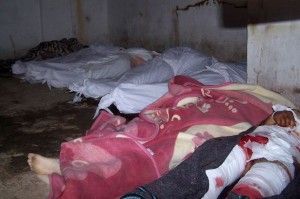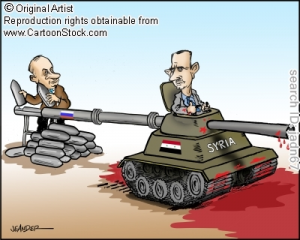 Sceptics about humanitarian intervention in Syria hit you with what they regard as a killer question: “Where do you stop?” If the “international community”, such as it is, tries to halt the massacres in Syria, why doesn’t it intervene in North Korea or Somalia? If the political partialities of your inquisitor lean to the pseudo-left, the whataboutery does not stop there. Guantánamo, drones, the West Bank, or whatever else is troubling them that day mean that nothing can be done for the Syrians until the lands of the west have been cleansed of their sins.
Sceptics about humanitarian intervention in Syria hit you with what they regard as a killer question: “Where do you stop?” If the “international community”, such as it is, tries to halt the massacres in Syria, why doesn’t it intervene in North Korea or Somalia? If the political partialities of your inquisitor lean to the pseudo-left, the whataboutery does not stop there. Guantánamo, drones, the West Bank, or whatever else is troubling them that day mean that nothing can be done for the Syrians until the lands of the west have been cleansed of their sins.
The only proper response to “where do you stop?’ is “when do you start?” The Universal Declaration of Human Rights is meant to protect against “barbarous acts which have outraged the conscience of mankind”. The conscience of mankind, however, has become remarkably forgiving of late.
What can outrage it? Not the 80,000 dead, according to the UN (a minimum of 94,000, says the Syrian Observatory for Human Rights). Not the 1.5 million the war has driven into exile in poverty-stricken camps, where families sell their daughters to dirty old men to pay for food. Not the United Nations, which last week talked of soldiers forcing children to watch the torture and murder of their parents and concluded that, while all sides were guilty of war crimes, rebel actions did not “reach the intensity and scale” of the massacres committed by government forces.
Few qualms have afflicted the conscience of dictatorial regimes. Russia, Iran, Hezbollah, Saudi Arabia and Qatar have practised illiberal intervention. But as for the conscience of the west, when it considers Syria at all, it finds liberal intervention unconscionable – nearly everywhere, that is, except in William Hague’s Foreign Office.
I accept that praising Hague (and by extension David Cameron) in the Observer is akin to praising the pope at an abortion rights rally. But no one reads this newspaper to have their prejudices confirmed (for what would be the point of that?). It is only from Hague’s Foreign Office and the Quai d’Orsay that you find a glimmer of an understanding of the moral and diplomatic questions the Syrian catastrophe raises.
We should never forget that the Syrian revolution began with peaceful demonstrators asking for democracy and a decent life. It was closer to the velvet revolutions of eastern Europe than the civil war in Libya. Assad’s forces responded by mowing down, raping and castrating the protesters.
We should never forget that the Syrian revolution began with peaceful demonstrators asking for democracy and a decent life. It was closer to the velvet revolutions of eastern Europe than the civil war in Libya. Assad’s forces responded by mowing down, raping and castrating the protesters. Syrian intellectuals warned me and many others that, if Nato did nothing, the war would spread to Iraq, Lebanon, Israel and maybe Jordan and southern Turkey, and they were right. Radical Islamists would fill the void, they continued, and again the only comfort they have today is that they were right about that too.
Hague is impressive because you do not need to tell him what he already knows. He accepts that the world failed Syria and gave Assad the time and space to brutalise the population. He at least is not surprised by reports of massacres. They are chronicles of deaths foretold.
Although you will never get British or French foreign ministers to say so in public, they also know that there has been a calamitous failure of American leadership. Russia, Iran and Assad have taken every opportunity available. The Nixonian Obama, as indifferent to abuses of human rights abroad as he is to abuses of civil liberties at home, has shrugged and looked the other way.
It is a sign of the parochial spirit of the age that the modest proposal by Britain and France to fill the vacuum by threatening to arm rebels has been greeted with fury on the right and left. I accept that it is hard after Iraq to talk of the national interest or of Nato or the EU’s interest. But the facts of grand strategy have not changed. Even if you can suppress all humanitarian impulses, it is not in the west’s interest to have an Assad regime more beholden to Iran than ever on the shores of the Mediterranean.
More to the point, without pressure, why would Assad come to the negotiating table and demand anything less than his opponents’ abject surrender? Why would rebels come to hear the terms of their capitulation? The threat of arming of rebels who profess democratic principles would tell Assad that he could not carry on regardless.
More to the point, without pressure, why would Assad come to the negotiating table and demand anything less than his opponents’ abject surrender? Why would rebels come to hear the terms of their capitulation? The threat of arming of rebels who profess democratic principles would tell Assad that he could not carry on regardless.
Labour, which is meant to represent the sensible wing of the British left, will not give Hague a fair hearing. During the Bosnian war, Douglas Hurd, the Tory foreign secretary in 1993, said he would not allow arms to reach the Bosnian Muslims for fear of creating “a level killing field”. Many on the liberal left condemned him. Hurd was ignoring the distinction between aggressor and victim, we said. He could not bring himself to say that the Serbs outgunned the Muslims and were taking full advantage of their superiority to ethnically cleanse the south-east Balkans.
Now the roles are reversed. A Conservative foreign secretary does not want to sit by as the bodies of the murdered pile up.
Meanwhile, another Douglas, Douglas Alexander this time, Labour’s “progressive” foreign affairs spokesman, breezily maintains that there is no need to help rebels because Syria is already “awash” with weapons. He then contradicts himself by maintaining that if Britain and France were to arm rebels – why would they need to if Syria were already “awash” with weapons? – the rebels would not come to the negotiating table.
 If Cameron were saying he was going to send British troops into another war, I would have no argument with Alexander. But he is condemning any application of diplomatic pressure. Russia has used every gambit it can think of to delay peace talks. British diplomats have told the Russian foreign ministry it can hold talks in the Kremlin and call them the “Moscow talks” or the “Russian peace process”… anything to get the process started. To no avail. Putin wants to give Assad as much time as possible. Nothing will change unless the terms of trade change first.
If Cameron were saying he was going to send British troops into another war, I would have no argument with Alexander. But he is condemning any application of diplomatic pressure. Russia has used every gambit it can think of to delay peace talks. British diplomats have told the Russian foreign ministry it can hold talks in the Kremlin and call them the “Moscow talks” or the “Russian peace process”… anything to get the process started. To no avail. Putin wants to give Assad as much time as possible. Nothing will change unless the terms of trade change first.
There is an alternative future. Faint though it may seem, there remains the possibility that the rebels will win without western aid. If so, they will be more jihadist, sectarian, brutal and anti-western when they take Damascus.
The words of my Syrian friends will then sound prophetic: “We will never forget how you forgot us.”
By: Nick Cohen
The Guardian
Top Photo: Another day another massacre in Syria. While all sides were guilty of war crimes, rebel actions did not “reach the intensity and scale” of the massacres committed by government forces

Leave a Reply
You must be logged in to post a comment.